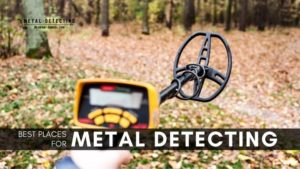We all know that learning from our mistakes is a big part of growing, but sometimes it’s even better to learn from the mistakes of others.
In this blog post, we’ll walk you through 5 common mistakes beginners make when metal detecting and how to avoid them.
So, buckle up, grab your gear, and let’s dive right in!
Mistake #1: Not Investing in the Right Metal Detector
It might be tempting to buy the cheapest metal detector on the market, but that could end up costing you more in the long run.
An unreliable detector can lead to false signals, missed finds, and a whole lot of frustration. Instead, take the time to research and invest in the best metal detectors for beginners.
Look for a device with an easy-to-use interface, adjustable settings, and a good reputation for durability and accuracy.
Mistake #2: Ignoring the Importance of Research
Many beginners jump right into metal detecting without doing any research beforehand. This can lead to unproductive hunts and missed opportunities.
To maximize your chances of success, take advantage of basic metal detecting research to find potential hotspots, learn about local laws and regulations, and understand the history of your chosen location.
The more you know, the better equipped you’ll be to make educated decisions and find valuable treasures.
Mistake #3: Digging Carelessly and Damaging Finds
We get it – you’re excited to uncover whatever’s buried beneath the ground. But in your excitement, don’t forget to be careful when digging.
Rough digging can damage your finds and even harm the environment. Here are a few tips to help you dig responsibly:
- Use a handheld probe: This will help you locate the target before digging, minimizing the amount of dirt you need to move.
- Dig a neat plug: When you do need to dig, cut a neat, round plug and set it aside. This will make it easier to fill the hole back in when you’re done.
- Clean your finds properly: Cleaning coins and other finds is essential, but be gentle. Check out these tips on how to clean coins found metal detecting without causing damage.
Mistake #4: Neglecting to Seek Permission
Many new detectorists make the mistake of not asking for permission to metal detect on private property. This can lead to tense situations with property owners and potentially legal trouble.
To avoid this, always get permission to metal detect on private land. You may be surprised by how many people are willing to grant you access if you approach them politely and respectfully.
Mistake #5: Going It Alone
Metal detecting can be a solitary hobby, but that doesn’t mean you should go it alone. Connecting with fellow metal detectorists can provide valuable insights, advice, and camaraderie.
Join local clubs, participate in online forums, and don’t be afraid to ask questions.
Learn how to find and connect with fellow metal detectorists to make your treasure-hunting adventures even more enjoyable and successful.
Frequently Asked Questions
Here are some frequently asked questions that beginners often have about metal detecting:
The best metal detector for a beginner is one that is easy to use, offers adjustable settings, and has a good reputation for accuracy and durability. Some popular models include the Garrett ACE series, Minelab Vanquish series, and Fisher F22. Check out our list of the best metal detectors for beginners for more information.
The rules for metal detecting on public land vary depending on the location. In some areas, it may be allowed, while in others, it may be prohibited or require a permit. Always check local laws and regulations before you start metal detecting on public land.
The depth at which a metal detector can detect objects depends on several factors, including the size and composition of the object, the type of soil, and the quality of the metal detector. On average, a beginner’s metal detector can detect small objects, such as coins, at a depth of 4 to 6 inches, while larger objects, like buried treasure chests, can be detected at depths of 2 to 3 feet.
Cleaning coins found while metal detecting should be done gently and carefully to avoid damaging them. Use a soft brush to remove dirt and debris, and soak the coins in a gentle cleaning solution if necessary.
Check out our guide on how to clean coins found metal detecting for more detailed information.
Finding good spots for metal detecting involves doing some research to identify areas with historical significance, high foot traffic, or known treasure troves. Use historical maps, local records, and online resources to help guide your search.
For more information, see our article on how to identify potential coin hotspots for metal detecting.
The legality of keeping items found while metal detecting depends on local laws and regulations. In general, if you find something on public land or with the landowner’s permission, you can often keep your finds. However, certain items, such as historical artifacts or items of significant value, may be subject to different rules. Always check local laws and regulations before keeping your finds.


